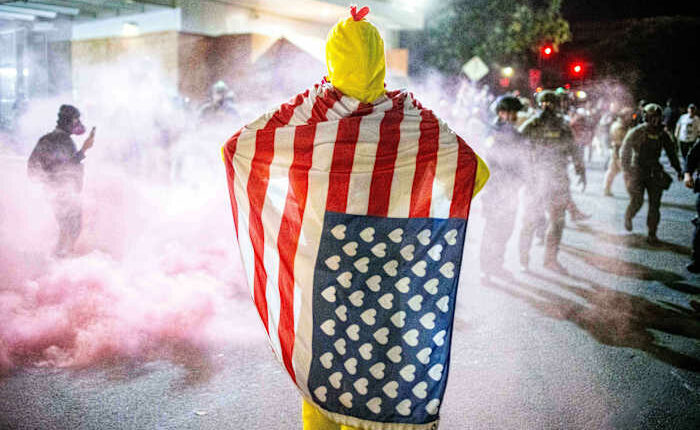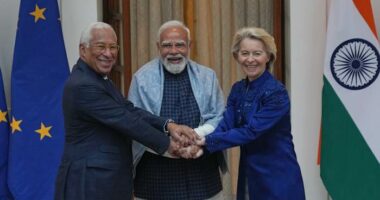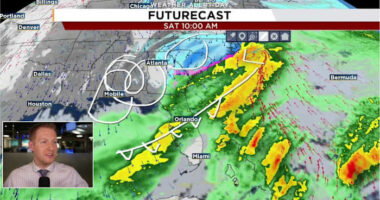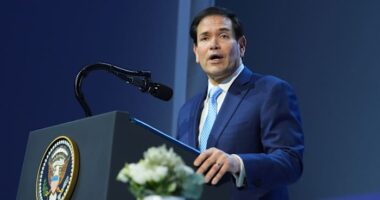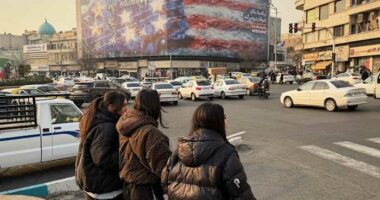Share this @internewscast.com

WASHINGTON – President Donald Trump’s recent move to station the military on U.S. soil despite local opposition is sparking a new conflict with governors from blue states, unfolding in the courts. Trump envisions a nation with armed soldiers patrolling its streets.
Trump has already stretched traditional limits by using the National Guard domestically, imagining a robust role for the military in combatting illegal immigration and crime in U.S. cities.
His effort to send California National Guard members to Oregon and Texas Guardsmen to Illinois represents a grand exercise of presidential power. Further steps in the legal challenges by Democrat-led states will likely explore key constitutional, federalism, and power separation issues—setting up a potential showdown between the courts and Trump’s assertive National Guard deployment.
Speaking to military leaders last week, Trump advocated for using U.S. cities as training grounds for troops, warning of an “invasion from within.” Critics, however, see Trump’s National Guard deployment as a frightening display of force against Americans.
“What will happen when the president loses in court?” asked Alex Reinert, a constitutional law expert at the Cardozo School of Law in New York City. “Will he use it as a reason to act in an even more authoritarian manner?”
An expanding role for the National Guard not seen before
Armed troops on American streets starkly illustrate Trump’s efforts to increase presidential power, with deployments already seen in Los Angeles and Washington, D.C.
Control over a state’s National Guard typically falls to the governor unless units are federalized — as they were in California over the governor’s objections. Otherwise, it’s up to the governor to decide to deploy Guard members or send them to other states to assist with natural disasters. In D.C., Trump commands the Guard himself.
Local authorities, Trump says, have failed to safeguard communities, giving several Democrat-led cities as examples. He’s called Portland “war ravaged” and a “war zone” that is “burning down” and like “living in hell.”
However, the nearly 150-year-old Posse Comitatus Act limits the military’s role in enforcing domestic laws, reflecting America’s long-standing belief that law enforcement should remain in civilian hands.
White House press secretary Karoline Leavitt said Trump wants to make America’s cities safer.
″You guys are framing this like, ‘The president wants to take over the American cities with the military,’” Leavitt told reporters Monday. “The president wants to help these local leaders who have been completely ineffective in securing their own cities.”
U.S. officials say the decisions to send federalized troops from Texas and California to other states are being made at the highest levels of the Trump administration, bypassing formal Pentagon policy processes that would normally be part of troop deployments.
While this dynamic is not unheard of, one official said, it’s typically used in situations like natural disasters where troops need to move out quickly before formal orders and authorizations. The officials all spoke on condition of anonymity to discuss the internal situation.
One result is that governors like California’s Gavin Newsom and Illinois’ JB Pritzker, both Democrats, have become the first to announce troop deployments. Pentagon public affairs officials have struggled to confirm or deny the actions and troop numbers, facing pressure to avoid giving even basic details of military operations and to defer questions to the White House.
The situation is far different from President John F. Kennedy’s move to federalize the Alabama National Guard in 1963 to integrate the University of Alabama in a standoff with Gov. George Wallace. That is because Trump is ostensibly seeking to use troops to protect federal property and personnel, not to enforce federal civil rights laws passed by Congress, according to William Banks, a Syracuse University law professor and an expert in constitutional law and national security.
The Guard members cannot enforce local laws, block traffic or do “any of the things that police do,” Banks said. “So it’s more symbolic than helpful.”
Legal challenges set up a clash over Trump’s deployments
Leaders in Illinois, Oregon and California have sued, while top White House figures blasted a Trump-appointed judge’s decision to block the deployment in Portland.
Stephen Miller, a top Trump adviser, suggested it’s the courts that have ignored constitutional limits.
“A district court judge has no conceivable authority, whatsoever, to restrict the President and Commander-in-Chief from dispatching members of the US military to defend federal lives and property,” Miller posted on X, likening the protests over Trump’s immigration policy to “domestic terrorism.”
Judges are not likely to be swayed by the bluster, legal experts say. Instead, they will look at whether Trump’s orders violate the Constitution and the federal laws governing how the Guard is used.
Trump’s opponents have relied on the court system to slow down his agenda, with the Republican-controlled Congress largely not checking his expansion of power.
With litigation piling up, Trump officials have shown disdain for judges and decisions they oppose but so far have avoided the direct kind of confrontation that legal experts say could do real harm.
“The potential that they would defy an order from a federal court is very worrisome,” Banks said. “That’s our backstop. That’s what we have in the United States to keep our democracy on the rails.”
Trump’s attempt to deploy California National Guard members to Oregon is a “clear violation of the law” and a flagrant attempt to circumvent the judge’s weekend ruling, according to Elizabeth Goitein, an expert on presidential powers.
Goitein, senior director of the Liberty and National Security Program at New York University’s Brennan Center for Justice, said Americans should be concerned that Trump and Defense Secretary Pete Hegseth see deployments in U.S. cities as practice for overseas conflicts.
“What the military is trained to do is to fight and destroy enemies of the United States. The president of the United States wants soldiers to practice this battle training in the streets of American cities,” she wrote on a social media.
___
Associated Press writers Chris Megerian, Seung Min Kim and Nathan Ellgren contributed to this report.
Copyright 2025 The Associated Press. All rights reserved. This material may not be published, broadcast, rewritten or redistributed without permission.
